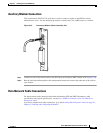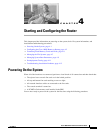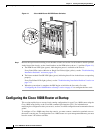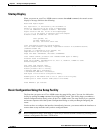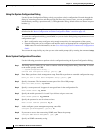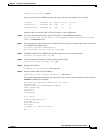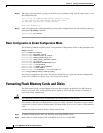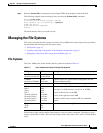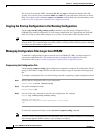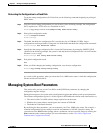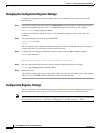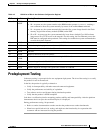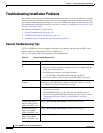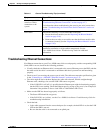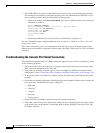
4-7
Cisco 10008 Router Hardware Installation Guide
OL-0659-13
Chapter 4 Starting and Configuring the Router
Managing the File Systems
Step 3 Enter the format diskn: command at the privileged EXEC mode prompt to format the disk.
The following example shows the display after you enter the format disk0: command:
Router# format disk0:
All sectors will be erased, proceed? [confirm]
Enter volume id (up to 30 characters): MyNewdisk
Formatting sector 1
Format device slot0 completed
Router#
The Flash memory disk is now ready for use.
Managing the File Systems
This section describes the file systems used on the Cisco 10008 series router and provides procedures
for performing the following basic file system tasks:
• File Systems, page 4-7
• Copying the Startup Configuration to the Running Configuration, page 4-8
• Managing Configuration Files Larger than NVRAM, page 4-8
File Systems
The Cisco 10008 series router includes the file systems described in Table 4-1.
Flash memory disks and the smaller Flash memory cards use similar commands. The primary syntax
change is that disk0: or disk1: refers to Flash memory disks, and slot0: or slot1: refers to Flash memory
cards.
Table 4-1 Cisco 10008 Series Router Principal File Systems
File System CLI Name Description
Bootflash
Secondary bootflash
bootflash:
sec-bootflash:
Stores image and dump files.
NVRAM
Secondary NVRAM
nvram:
sec-nvram:
Typically stores the system default configuration file and
startup configuration file.
System system: Stores the running configuration and other system files.
Disk 0
Disk 1
Slot 0
Slot 1
Secondary Disk 0
Secondary Disk 1
Secondary Slot 0
Secondary Slot 1
disk0:
disk1:
slot0:
slot1:
sec-disk0:
sec-disk1:
sec-slot0:
sec-slot1:
Disk refers to an ATA Flash disk (48 or 128 MB).
Slot refers to a Flash memory card (8, 16, or 20 MB).
0 refers to the left slot on the PRE.
1 refers to the right slot on the PRE.
Secondary refers to the secondary PRE in a redundant
system.
FTP
TFTP
RCP
ftp:
tftp:
rcp:
Protocols used for accessing files that are stored remotely.



